When Crystal Clevenger’s son Mason brought a Tooth Truck appointment form home with him from kindergarten, she thought his visit to the mobile dental office would go like it did for his older brother. He’d get a cleaning, X-rays and an exam, like the Tooth Truck team provides for any underserved Springfield Public Schools student who qualifies for the free care. But after the first visit, Mason brought home an update Clevenger wasn’t expecting.

His brother only needed the cleaning and the checkup, but during Mason’s visit, the dentist found five cavities in his baby teeth. The form included that info, and an estimated cost to extract them: $1,800. The price shocked Clevenger, whose family doesn’t have dental insurance. But then came both relief and gratitude, she said, once she realized it wasn’t a bill.
She had assumed the Tooth Truck would just refer kids to dentists for more elaborate dental care.
“I didn't realize that they were going to completely do all of this stuff that he needed and that they were willing to help that way,” Clevenger said.
The dollar amount on Mason’s form helps the Tooth Truck team keep tabs on the total value of free care the charity program has provided for Springfield kids over the two decades it’s been in service. As of the end of September, that amounted to more than $21 million.
Why care?
A child with a lack of access to oral health care can have trouble eating, speaking, playing and learning, according to the CDC. Missouri ranks 47th nationally in terms of dental care access, according to the Missouri Coalition for Oral Health. In Springfield, the Tooth Truck has treated more than 30,000 students with numerous barriers to dental care.
Breaking the cycle of poor oral health care access in a 43-foot-long RV
As of the end of September, 30,189 Springfield students have received free oral health care in the Tooth Truck, a Ronald McDonald House Charities of the Ozarks program that brings a dental team to school sites via a custom-built RV, sometimes driven there by Dr. Sarah Cimino, who has earned both her DDS and CDL.
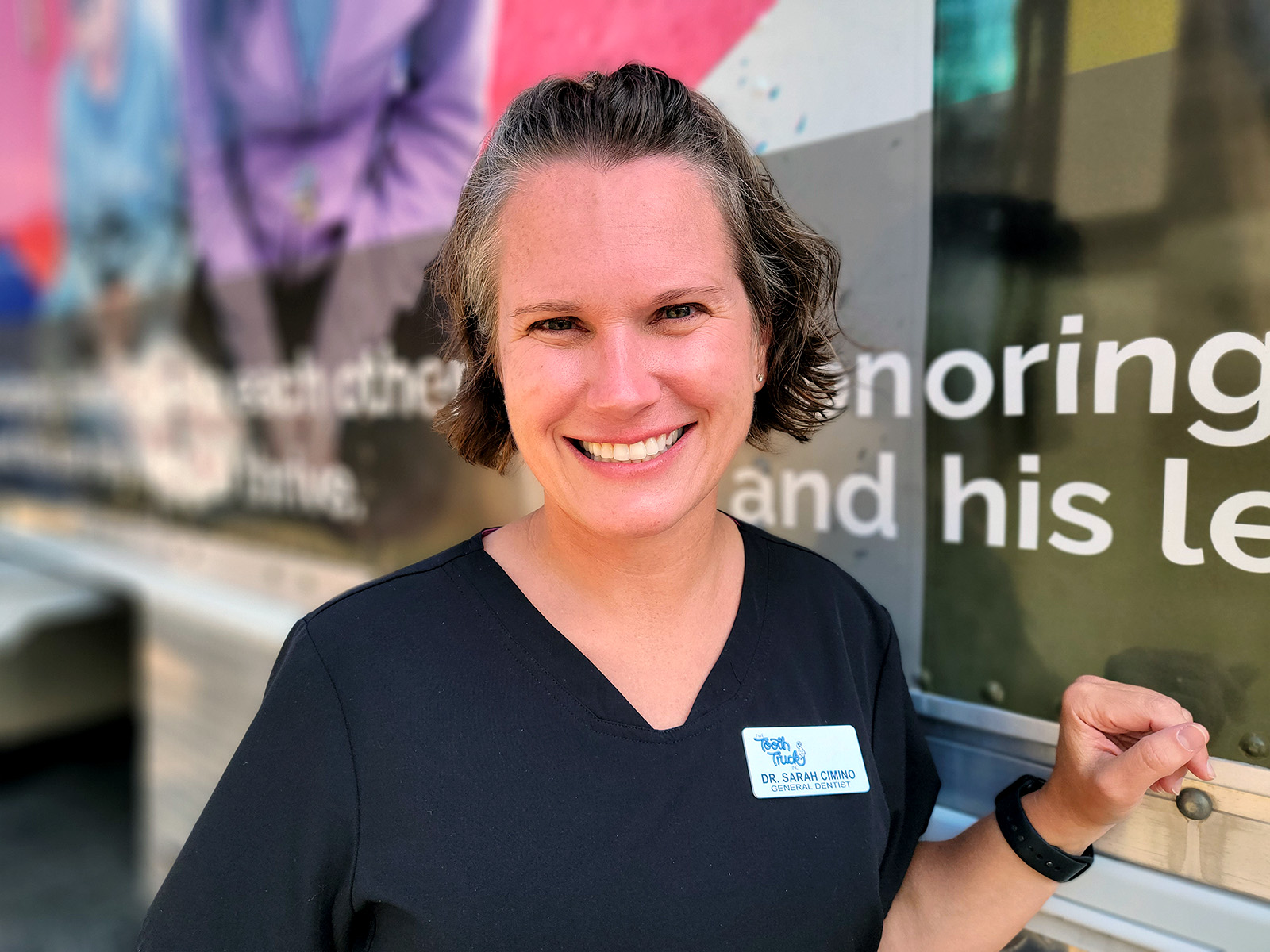
If you have a toothache, even a minor one, Cimino said, it’s difficult to think of anything else, let alone your education.
“If you're sitting in class and trying to learn and a tooth hurts, you're not learning,” she said. “Then you go to lunch, and you're probably not eating very well. Then you go home and you're not sleeping well. So you know, it affects all aspects of a kid's life, you know, and you've got a little kid who, they can't verbalize sometimes, ‘Why am I not focusing?’”
For many people, getting a six-month checkup is the norm and something we take for granted, said Lee Ann Neil, SPS director of health services. For children who qualify for Tooth Truck care, the opportunity “has life-changing benefits,” she said. Kids who hardly ever opened their mouths smile in yearbook photos or prom pics.
“She calls it doing ideal dental care,” Mindy Munoz, Tooth Truck program director, said of Cimino. “One of her very favorite things is to fix a chipped front tooth. It's mostly a cosmetic thing, but just to watch the transformation in somebody's eyes when they see the smile that they should have.”
Cimino has worked with students who have over 20 cavities at once. The staff has handed toothbrushes to teens who are homeless and haven’t had one for weeks.
“And that's the least of his worries, you know?” Cimino said.
“We're never shaming them for what is in their mouth, because 99 percent of the time, it is completely out of their control. You could have a parent who has full dentures. That parent is not brushing their teeth and flossing, and obviously, there was something that led to that for that parent. It's kind of like the cycle of poverty. Oral health is the same thing. There is a cycle of lack of education on oral health. If you didn't have it yourself, and you still don't really know how to take care of your own teeth, how are you going to teach this child how to do it?”
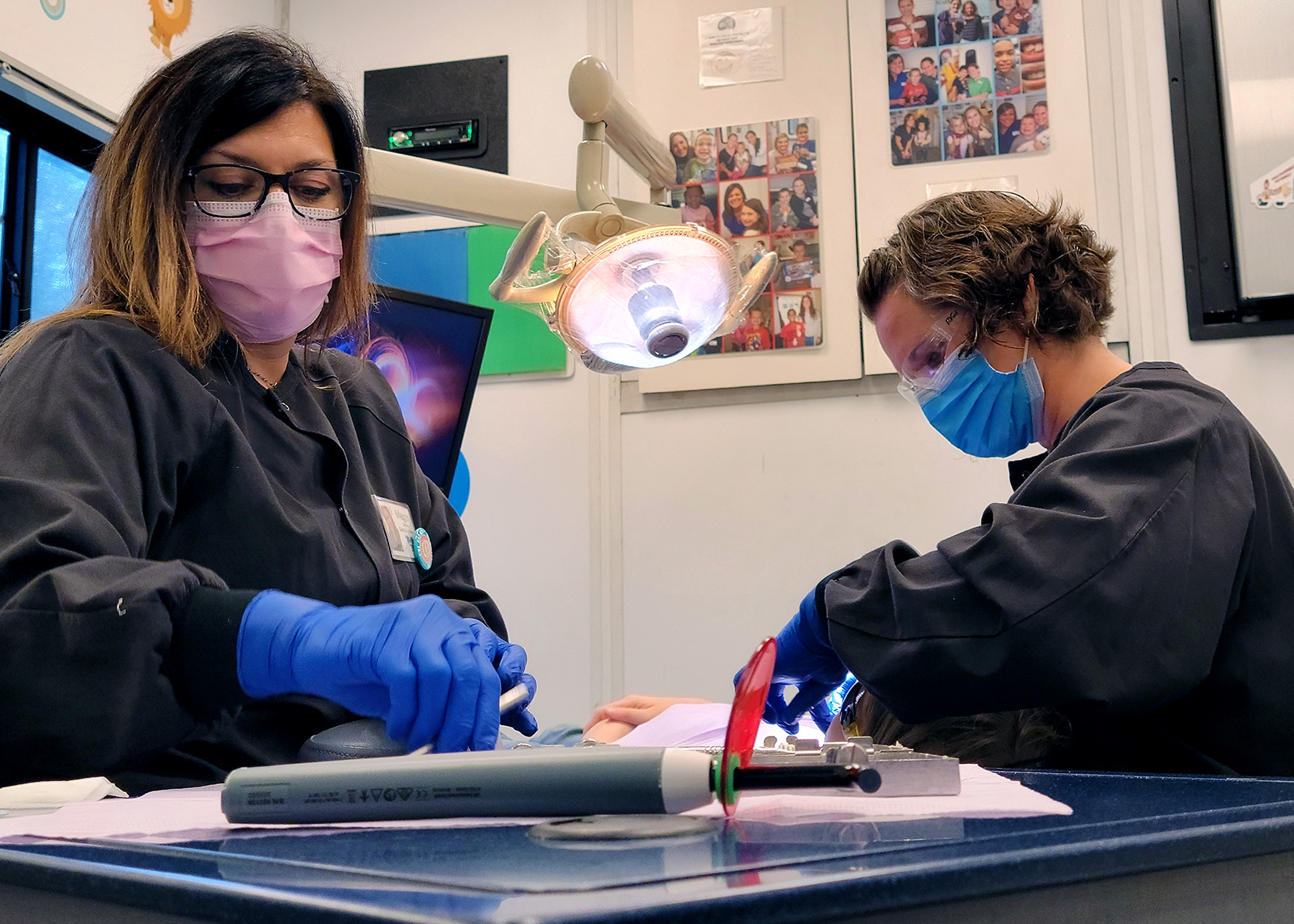
Tooth Truck has provided care for thousands of kids most at-risk of slipping through cracks
Students who qualify for free or reduced lunch, are uninsured and haven’t had a recent visit to the dentist qualify for care on the truck. Medicaid status isn’t a prerequisite, either. Last year, 1,675 students, or about 7 percent of the district population, received dental care during the course of 2,359 visits to the truck.
Twenty years ago, when Ronald McDonald House Charities started working with the school district and local dentist association to develop a strategy to help underserved students, being mobile was key to it, Munoz said. Setting up shop in school parking lots eliminated additional barriers parents had to provide dental care access for their kids, like taking off time from work and pulling kids out of school for half or all of the day, Munoz said.
At the start, the Tooth Truck served two grades of children at 16 high-need schools. Now, the team serves K-12 students across the district to address a need that hasn’t gone away. The latest Community Focus Report, which measures area strengths and weaknesses every two years, cites a lack of dental care access as a red flag in Greene County. That flag has been raised for decades both locally and statewide.
Missouri ranks 47th in the nation in dental care access, according to the Missouri Coalition for Oral Health. Across Missouri, the patient-to-dental provider ratio is 1,670-to-one. In Greene County, it’s 1,350-to-one. Top U.S. counties offer a 1,210-to-one or better ratio, according to County Health Rankings and Roadmaps.

That ratio doesn’t account for additional economic barriers to access, like the fact that about seven out of 10 dentists in the state don’t provide care to patients on Medicaid. The Missouri Dental Association’s executive director said that’s tied to the state’s dreadful reimbursement rates compared with what private practice insurance or cash-paying clients pay. (Legislators recently addressed the issue with a rate increase, although the federal government recently had to step in to help address a months-long Medicaid application processing backlog.)
Knowing Tooth Truck patients are receiving dental care access for the first time in a while, or maybe ever, led the team to follow recommendations of local dentists in outfitting the space with new equipment that would be found in a private practice office, Munoz said.
“It's more important for us to have the very best, because we don't know that we will see this child again, because we're not a dental home,” Munoz said. “We're not doing six-month cleanings and checkups, so we have to provide the very best care while we have them in the chair.”
The students’ dental needs led the school district last year to approve a major investment in the Tooth Truck program, Neil said.
When federal COVID relief funding became available for SPS to invest $3 million in health and counseling services, Munoz got a call from SPS staff suggesting she make a request on behalf of her program.
“You know, when we first thought they were asking for what we needed, I thought they meant like a new handpiece or a new chair,” she said. “They're like, ‘No, like a new truck.’”
Next month, a new Tooth Truck will be pulling into public school parking lots, thanks to $525,000 in funding from SPS for the custom-made vehicle and dental equipment.
“I think we just saw the good that's been done, obviously for the last 20 years,” Neil said. “And it's millions of dollars of support. (Prioritizing) that new state-of-the-art dental unit, we recognize, is going to just absolutely be integral in providing that continued access. So bottom line, knowing that the need was there and that this is a very strong partnership, a long-standing partnership, it was important to help the organization continue that mission. I think that's why it was kind of a no-brainer.”

‘What’s best for the kid and the tooth‘
On Oct. 10, the old truck was parked outside Weller Elementary. In the cab of the GMC, the dashboard odometer read 69,834 miles. On the outside, a custom wrap featuring photos of smiling former patients greeted the nine kids led inside before the staff took lunch. Inside, the last patient of the morning sat down in one of the truck’s two exam chairs.
Kids’ art and thank-you notes decorated the walls surrounding her while a cartoon played on the TV clamped to the oral light lamp. She had her initial checkup the week prior and was back in the chair for a sealant application, which Cimino said should preserve the health of her baby teeth and buy her family more time before she needed dental care again.
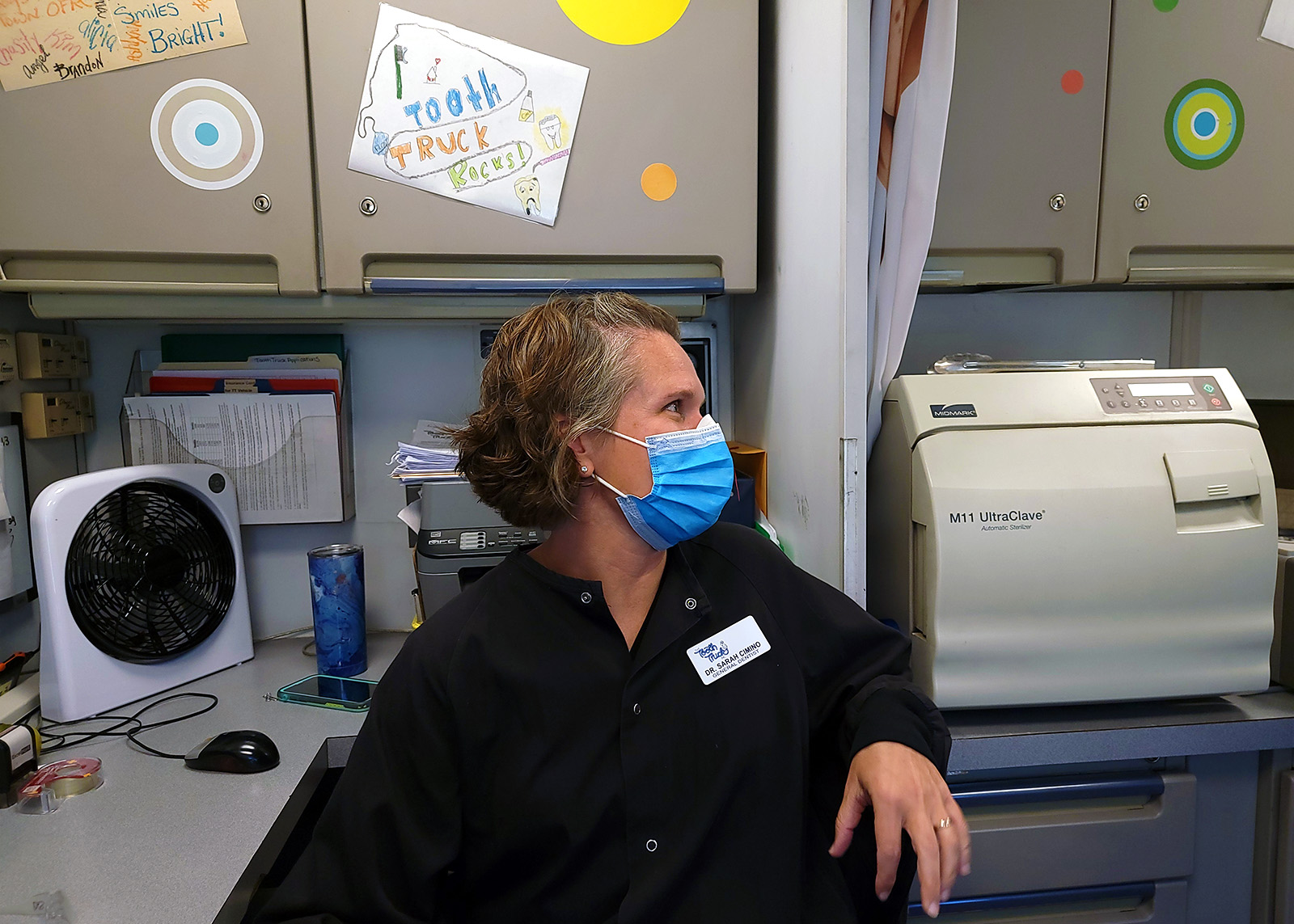
“In private practice, dental insurance usually only pays for sealants on the permanent teeth, so that's all they would probably get,” she said. “Because we don't care what gets paid, what doesn't get paid — none of our kids have private dental insurance — we do baby teeth as well because it's still a tooth that can get a cavity, and it's still a tooth that usually is in their mouth until they're anywhere from 10 to 12 years old. So why would I not protect it?
“The biggest thing I tell people I love about my job is that I don't ever have to worry about insurance, and I don't have to worry about what the parents can pay. So nothing we do is driven by reimbursements. It's all just what the kid needs and what's the best for the kid and the tooth.”
Staff developed expertise in working with kids
To her patient, Cimino compared the sealant process to applying nail polish and the gel to the taste of shampoo.
“I don't know why they make it taste bad when it's going in the mouth,” she told her. “You would think somebody would invent stuff that tastes better. Now, we're going to wash it off, and take a little shower.”
Honesty and a shared language are key to the dentist-patient partnership, she said. She doesn’t surprise any patients who need a tooth extracted, but she doesn’t use the term “extracted” with them, either.
“In front of the kids, we just talk about wiggling it out,” she said. “With most of them, we can say, ‘You're already without some of your teeth, so we're just going to wiggle out that one you couldn't quite get,’ or whatever we need to say.”
It’s all tailored to the age of the patient, she said. Sometimes, 18-year-olds don’t care if a movie is playing on the TVs connected to the two examination chairs, but they want to hold a mirror and watch what’s happening to their teeth as Cimino works on them. For younger kids, though, the staff notes in their patient charts not only their hygiene issues but also their movie and prize preferences. For someone coming back after a checkup for more extensive work, they can have “Despicable Me,” “Frozen” or another movie queued up to make the experience a little easier.
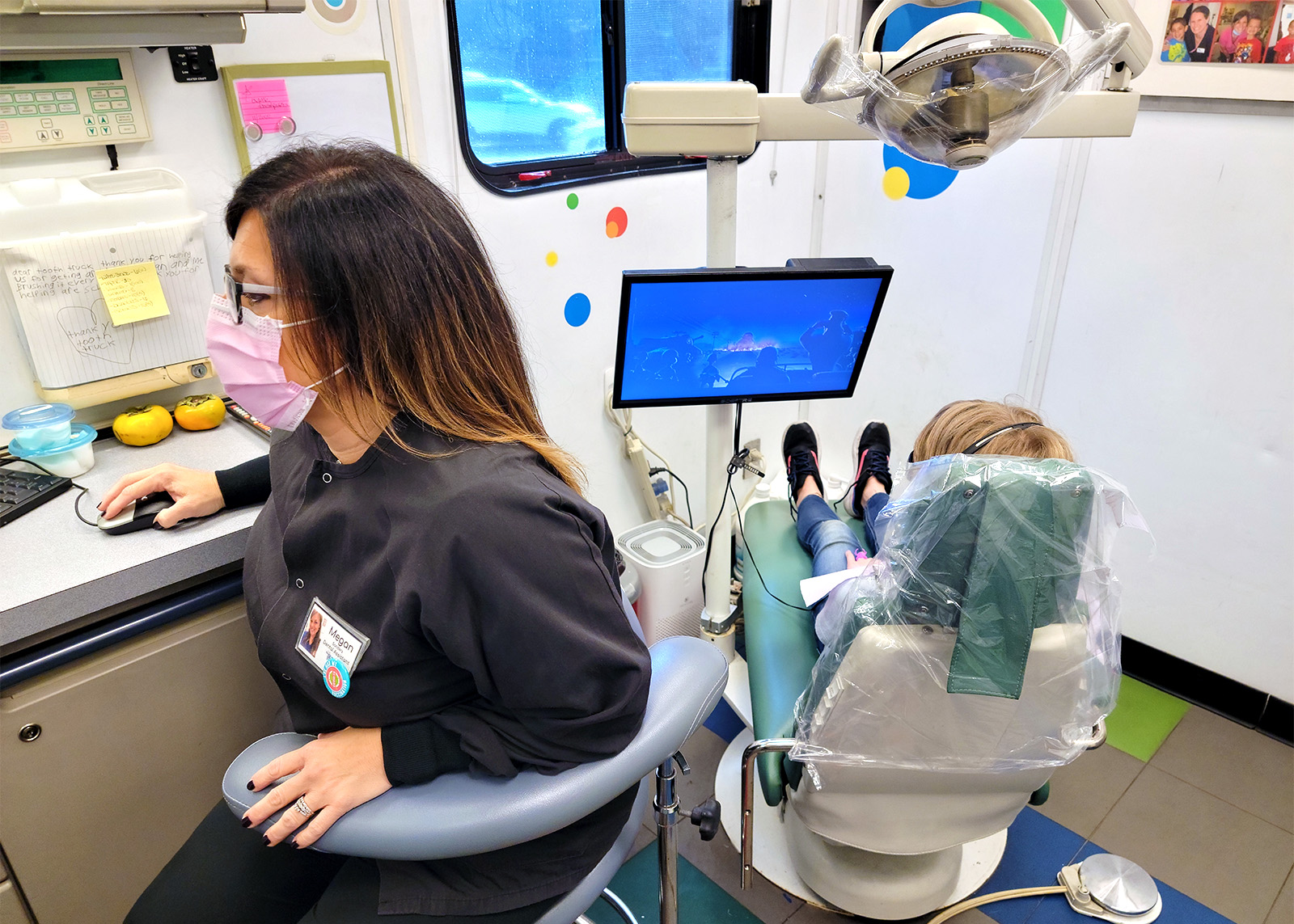
Ideal dental care led Tooth Truck dentist to stay well beyond initial 18-month job commitment
Cimino is a Springfield native who graduated from Glendale and went to dental school in Kansas City. She focused on pediatric care in dental school and often worked with kids at the private practice where she was hired after graduating. They liked her and she liked them, she said.
About 12 years ago, she and her husband decided to move back to Springfield so she could start her own dental practice. She saw an opening for the Tooth Truck dentist position and applied, thinking it would be a meaningful job while she lined up office space, staff and everything else she’d need. She told the charity’s staff as much during the interview process, saying she would join them if they were open to hiring someone who would leave the job in 12 months. They compromised at 18 months.
But she’s been in the Tooth Truck since 2011.
Cimino joined Munoz on a recent trip to Wisconsin to check out the new Tooth Truck, which is near completion. There, she not only toured the truck but also suggested which way cabinet doors should open, where to station X-ray machines and other details she’s developed unbending opinions on after spending more than a decade working in concert with assistants and an office manager in a 200-square-foot space.
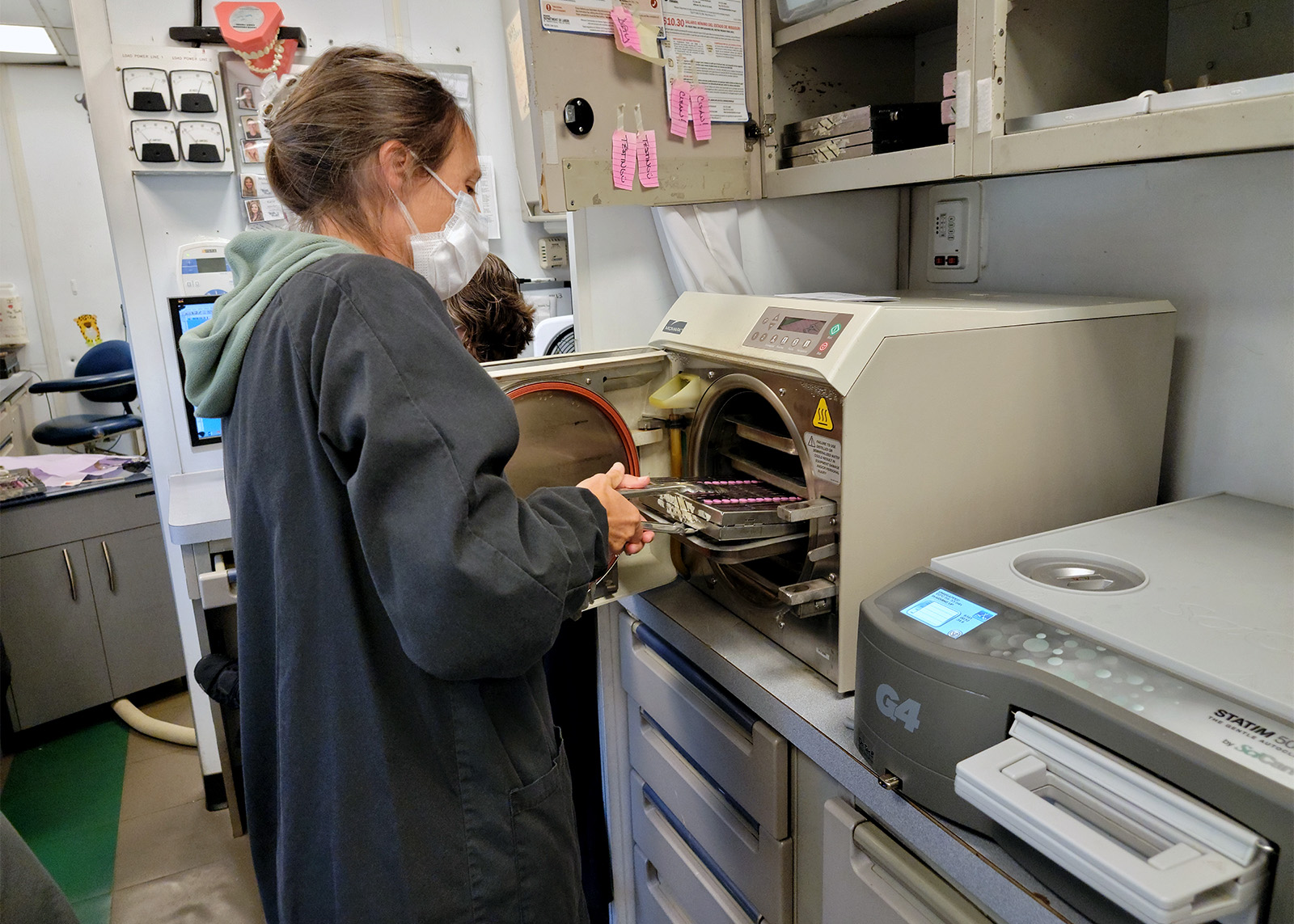
For the first time, Cimino won’t have to kick a coworker out of their desk chairs to fill out paperwork or take a sip of coffee — she’s getting her own office corner. Time and time again, she said, the level of investment in the public health program has awed her. In dental school, when she rotated through clinic offices, a lack of funding for many of those programs came at the expense of the patients in need. A filling would be the wrong shade of white, she said, but people dealt with what was available.
“My idea of it was very much like you're almost giving substandard care just because someone can't afford it,” Cimino said. “Then I got here, and if anything, these kids are getting better care because there are not all of those constraints, and Ronald McDonald House buys us whatever supply is the best for the patient.”
Without free care in Tooth Truck, mom says her 5-year-old would have had to go without, as she has
About five months ago, a toothache began to plague Clevenger, Mason’s mother, who said she has a “massive phobia” of dentists.
“I hadn't slept for a few nights because my mouth (hurt), and I could hardly work,” she said. “And I was crying, like, all day long because it hurt so bad. And I would have still not gone if somebody probably wouldn't have pretty much almost dragged me there.”
Her husband finally convinced her to seek care for it. Without insurance, she said, she had to pay over $300 upfront to get it looked at by a dentist. It would need to be pulled, she learned, but not before she took prescribed anti-anxiety medication to deal with the experience. She returned the next day, got the tooth pulled and learned she has two other impacted teeth along with her wisdom teeth, which will all soon need attention.
“They just wanted over $300 for that one tooth pulled,” she said. “I can’t imagine what it would cost to be put under and have all of those things happen. I don’t know how that would ever happen.”
The experience she had was no comparison to the care her youngest son recently received on the Tooth Truck.
Last winter, Mason needed three appointments to get his five baby teeth extracted, so Cimino and her staff worked with Clevenger to arrange times at the ends of a few school days at different sites. Clevenger didn’t have much trouble navigating her schedule at the fast food restaurant where she works, but she said she wanted to keep her son in class as much as possible.
“Mom drove all over Springfield to bring him to us, so that we could get those (pulled),” Cimino said.
Mason’s chart noted that he liked “Paw Patrol,” which led the Tooth Truck staff to make sure the prize bin had some of the cartoon franchise’s stuffed animals in the drawer for each of his trips.
“We were able to build a relationship with him and with the family and get everything fixed,” Cimino said.
Clevenger said Mason doesn’t fight her anymore about brushing his teeth, even though he’d prefer she does it for him. On Oct. 14, the Clevenger family were guests at the Ronald McDonald House Charities of the Ozarks annual Red Shoe Gala, where they “drove” a cutout of the new Tooth Truck through the audience. Clevenger said she was happy to do it, because of what the charity did for her son.
“That would have not been something that we could have done,” she said. “Like, he would have just continued having the cavities. But they covered all of that, and that was such a great relief. None of our other sons have had cavities like that. We're not sure what happened there for Mason to have had so many. But we're very grateful that the Tooth Truck was there to help us, because we wouldn't have been able to do that.”
How to get involved
The average cost of treatment for a child on the Tooth Truck is about $250. Ronald McDonald House Charities of the Ozarks accepts donations online for care here. The Tooth Truck is also slowly bringing back community volunteers. More information is available here.

